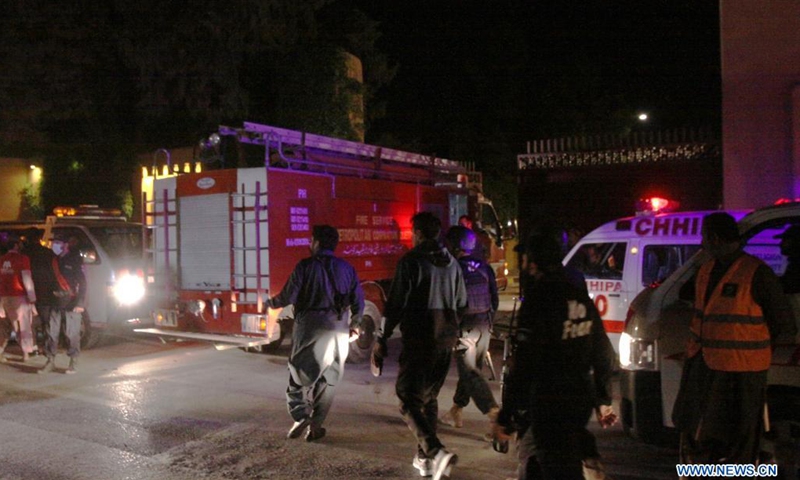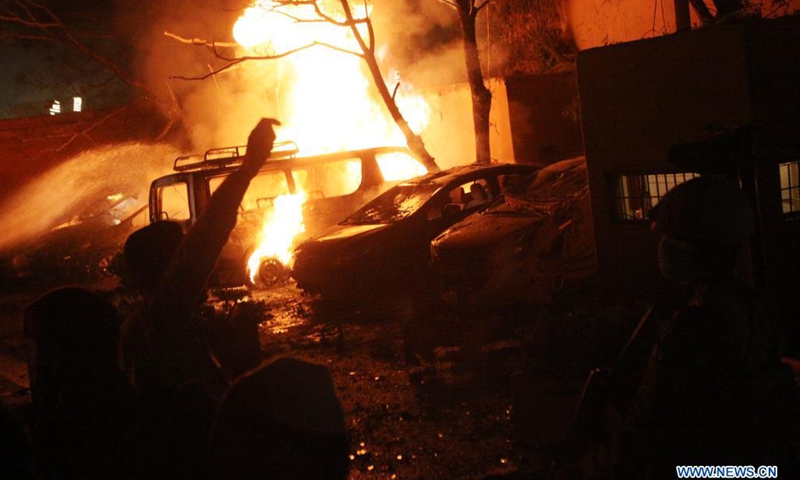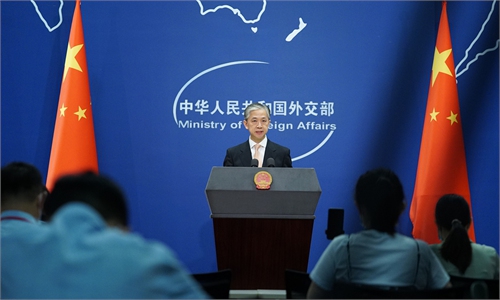Pakistan blast underscores mutual mistrust with US for counterterrorism

Security forces arrive at the blast site in Quetta, Pakistan's southwest Balochistan province, on April 21, 2021. Three people were killed and 11 others injured when a bomb went off inside the parking area of Serena hotel in Balochistan province Wednesday night, hospital sources said.(Photo: Xinhua)
A powerful explosion struck the parking lot of a luxury hotel in Quetta, Balochistan province in southwest Pakistan on Wednesday. Officials said at least four people were killed and 12 others wounded. Chinese Ambassador to Pakistan Nong Rong was leading a visiting Chinese delegation that stayed at the hotel. The Chinese delegation was safe and all casualties were of Pakistani nationals, officials said.Balochistan is divided into two parts: About five-sixths of its land is inhabited by Baluchis and one-sixth by Pashtuns. The region is close to Afghanistan, and it has a complicated situation of combating terrorism with separatist forces continuing to thrive. In Quetta, there are the Hazara minority, whom look very much like Chinese.
Generally speaking, the schedule of a Chinese ambassador is strictly confidential. Only officials of special departments in Pakistan know about it. It is highly unlikely that the Chinese ambassador's whereabouts were leaked to terrorists. For this incident, it is more likely that the terrorists mistakenly identified the Chinese delegation for being local Hazaras.
The Pakistani Taliban, also known as Tehreek-e-Taliban Pakistan, claimed responsibility for the bombing. The Pakistani Taliban's strength in Pakistan is fading in recent years. From August 2018 to the present, there have been several terrorist attacks against Chinese people, including one against the Chinese Consulate-General in Karachi in 2018 and the other against the Pakistan Stock Exchange building in Karachi in 2020. These attacks are of relatively high density, which makes people feel that the safety of Chinese nationals in Pakistan has been threatened.
However, none of these incidents were directed against Chinese people by the Pakistani Taliban. Since the Pakistani Taliban has claimed the attack this time in Quetta, it has little to do with targeting at Chinese people.

Fire breaks out at the blast site in Quetta, Pakistan's southwest Balochistan province, on April 21, 2021. Three people were killed and 11 others injured when a bomb went off inside the parking area of Serena hotel in Balochistan province Wednesday night, hospital sources said.(Photo: Xinhua)
According to the South Asia Terrorism Portal, Pakistan witnessed 319 terrorism-related incidents in 2020 declining from nearly 4,000 in 2013. It should be said that Pakistan is becoming safer, rather than more dangerous. The recent attacks come at a time when Pakistan has scored a major victory against terrorism. It can only prove that terrorist groups are using new methods to conduct terrorist attacks, but the overall strength of them has been greatly weakened.Terrorist forces in Pakistan exist because of various factors. For one, local tribes in Balochistan have sharp frictions with the federal government, which mainly focuses on resources, finance and governance. Ethnic secessionist forces in Balochistan have tended to split the nation and the country. This is anticipated to continue.
For another reason, religious extremist terrorist groups in Pakistan are still popular. The education on de-extremization has not become universal. Defining what are correct religious views and values remains quite vague. Many people still hold a positive view toward Al Qaeda and ISIS. Moreover, religious extremist forces have not been totally eradicated. This makes Pakistan a fertile soil for religious extremist terrorist organizations to breed and develop.
Both Afghanistan and Pakistan are vital to US' counterterrorist strategy. Some analysts believe the US has geopolitical demands in Afghanistan where the US has more counterterrorist cooperation activities than in Pakistan. As a matter of fact, counterterrorism is not a dominant part of US' global strategy. There is no doubt that due to Al Qaeda the so-called Khorasan branch of ISIS in Afghanistan, Washington has attached more importance to this country than Pakistan in its counterterrorist strategy.
In terms of counterterrorism, the US tends to exploit Pakistan's Inter-Services Intelligence Directorate and its army to conduct the counterterrorist missions in this country. Regardless of whether or not the US fully withdraws its troops in Afghanistan, the US is doing this for anti-terrorism efforts. Washington's moves to urge Pakistan to promote the Afghan peace process are also related to its counterterrorism strategy.
It cannot be concluded whether or not the US can withdraw all its forces from Afghanistan at this current stage of operations. What worries the US most is that terrorist and extremist groups will exploit the territory of Afghanistan to attack the US. However, Washington is reluctant to get mired down into the mud of the War in Afghanistan
Pakistan is still the US' pivotal non-NATO ally to engage in anti-terrorist activities. Yet US and Pakistan lack mutual trust. At present, in regard to their cooperation in counterterrorist efforts, the two countries continue coordinate. Both countries need each other, but are short on trust.
The author is a senior researcher of Chongyang Financial Research Institute, Renmin University of China. opinion@globaltimes.com.cn


